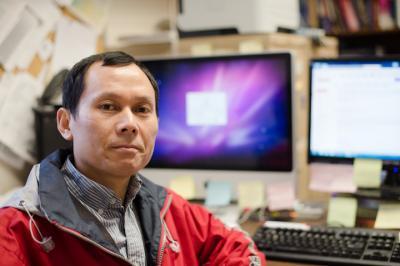Peptides are an intriguing class of drugs. They are made of amino acids, just as humans are, and because of their intimate relationship with our own biological molecules, they have the potential to fight some of the most intractable diseases, including cancer.
But they can be difficult and expensive to make. A year's worth of the anti-HIV peptide drug enfuvirtide costs $25,000. Now a chemist at Michigan Technological University has overcome an important hurdle in the manufacturing process by developing a quicker, simpler purification method. As a bonus, his technique also works on DNA.
The new technology separates perfect peptides from those that do not make the grade, says Shiyue Fang. During production, amino acids attach to each other in chains to form the desired peptide, but some of the chains are never completed. To separate these truncated peptides, Fang's team adds a polymerizable group of atoms to the mix.
These atoms bind to either the perfect peptides or the unfinished ones, but not to both. The polymerized peptides become insoluble and precipitate out of the solution. "Just take the solution out, and the peptides are separated," said Fang.

Shiyue Fang, an associate professor of chemistry at Michigan Technological University, has developed a new purification technique for peptide drugs and other biomolecules. The discovery could help pave the way for less expensive cures for intractable diseases such as HIV and cancer.
(Photo Credit: Sarah Bird/Michigan Technological University)
The method works in about two hours, much faster than a similar process Fang developed a few years ago. And it works equally well for DNA sequences.
The process has other advantages. It is cheaper and requires less labor than existing peptide purification methods, it can handle large batches of peptides at a time, and it generates less waste. "Other methods use a large amount of organic solvents, with a waste-to-product ratio of about 1,000:1. Our waste-to-product ratio is 50:1, maximum," said Fang. "And it takes less time."
Fang has been issued a patent for his discovery and is exploring its commercial potential. "I'm excited about the progress we've made," he said. "Peptide drugs are used to fight cancer, inflammation, diseases of the central nervous system, viral diseases like HIV... This gives us a chance to make a difference in people's lives."